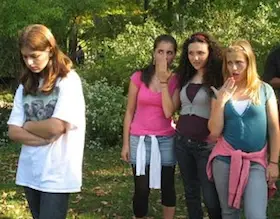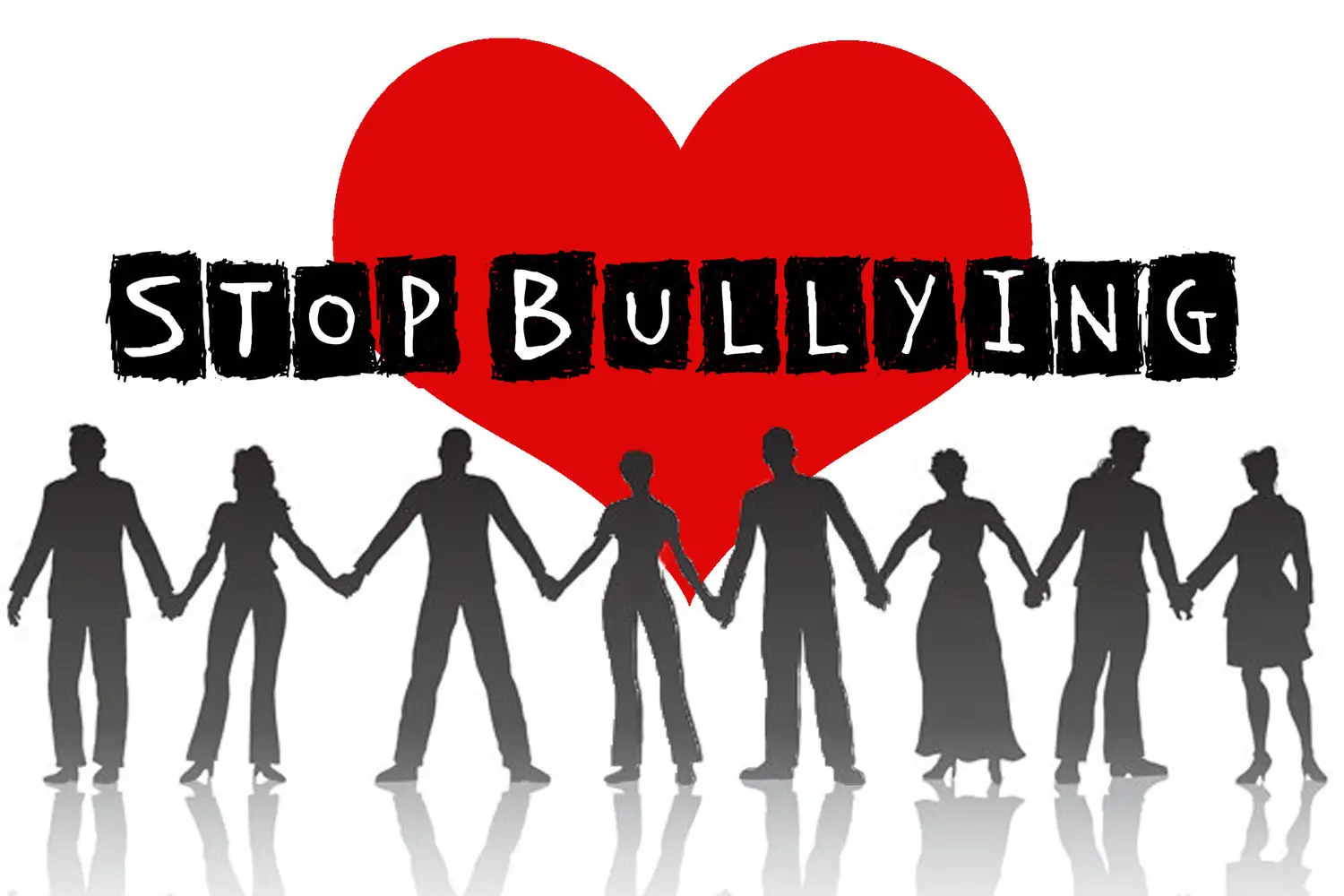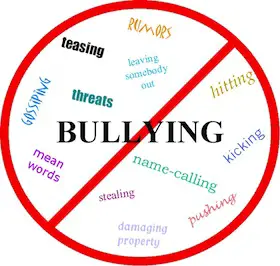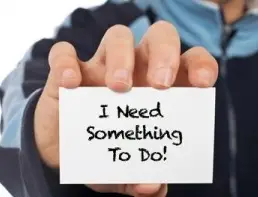In this lesson we are going to explore teen bullying.
In it you will learn:
- Why teenagers are bullying others
- Why teenagers are getting picked on
- How our youth are just reflecting the world around them
- The importance of getting to the root cause
- A step-by-step guide on what to do and the talk you can have with your child
- Bullying from a male and female perspective
Think back to when you were a teenager and saw someone being picked on. How did it make you feel? What crossed your mind when it was happening? Did you feel a sense of injustice, anger, sadness, or helplessness? Or did you feel numb to the whole situation? What do you want to teach your child about bullying? What important lessons or concepts would you like to share with them?
Our Children Reflect The World Around Them
As teen bullying is at an all time high, what I find interesting is how parents can be so shocked that their kids might be bullying someone or getting bullied. Teenagers are just reflecting what society already does. People in society form cliques all the time and speak down to other groups of people. Just take a look at our political system and corporate behavior and they are doing the exact same thing bullies do. Why then is it so shocking to see our teenagers bullying others?
Bullying is a direct reflection of our world when it comes to status and groups. When teenagers decide to pick on a specific person or group of people, it’s because they are emulating what they see in the world; weak vs. strong. They believe they’re the strong ones and need to show off their power. This type of exploitation is going on in many forms all around us.
The truth is that the kids who are bullying are weak and sad individuals. Those doing the bullying feel so inferior that they need to pick on someone else to make themselves feel better. They see themselves as disconnected from the rest of the world and attempt to gain power by picking on others. Because they have not discovered their true value, they feel that the only way they can feel empowered is to disempower someone else.
Think about how certain factions of the US government enter other nations and treat the locals there. It’s well documented (read “Confessions Of An Economic Hitman” by Jon Perkins) that many of the people in power view these third world countries as less than them. Hence we use our military force (bullying) to take their land and resources to get what we want because we think we are more superior. The sad truth is that certain people in our country who use the US government for their gains are actually sad, lost, and confused souls, and via their “bullying”, display how powerless they actually feel.
 A Vicious Cycle
A Vicious Cycle
Many kids who are bullies are sad and angry inside and feel the need to take their emotions out on someone else. Because many children are having trouble at home whether they feel angry, unheard, unloved, and so on, they feel that the only way they can get any attention and feel better about themselves is by picking on someone else. It’s a vicious cycle wherein one person is being abused either mentally or physically and in turn takes his or her aggression out on someone else.
What To Do
If your child is being bullied, there are a few things to consider when talking to them about it. First you need to explain to them why it is happening from “those kids” perspective. You can say something like:
“They are picking on you because they feel weak inside and need to feel stronger. By picking on you, it helps them feel better about themselves even though they’re sad and lost.”
Another key lesson here (although a tough one to learn in these circumstances) is not to take things personally. Even though your boy or girl will internalize being bullied as their fault or feel that they’re the weak one, they need to understand that others do things (like bullying) because of their own insecurities and issues.
Inferiority Complex
The other thing that may be happening is that your child is exuding a “weak” energy and bullies like to prey on this. Either that or they are insecure, shy, or “awkward” and have not found themselves. The best way to keep them from being picked on is to either:
Become Confident – The way they can do this is by discovering their talents in life and getting good at them. As their parent, you need to help your teenager discover their authentic self so that he or she exudes a confident energy. Once they truly discover their core talents in life and get good at them, their self-confidence will grow and the other kids will pick up on this “vibe”.
Fight Back – Most parents do not want to hear this and although it would be nice if we could just tell our kids why it’s happening and to ignore it, for the most part this will not be enough. You may need to get your child into a martial art class like Jiu Jitsu or kickboxing so they can learn to defend themselves. Not only will he or she be able to put an end to getting picked on, they will also gain a lot of confidence. Just make sure that if they do learn any form of fighting that he or she understands the context (defense only).
Your Role
You need to be strong, grounded, and centered when helping your child address teen bullying. Reacting from a fear-based perspective is the worse thing you can do because this is all about them facing their fear and they’re going to be taking their strength from your cue. Your child needs you to be strong so they can use your strength to support their courage.
You will also need to prepare yourself for the fact that your child is in for a rough ride both physically and emotionally. If they’re being verbally assaulted then you need to be prepared for handling their emotions. If he or she is being physically assaulted then be ready for the fact that they could come home with bruises and scars. Once again, you need to remain neutral and not react with fear or anxiety. By providing them a strong foundation with love and courage, it will make it much easier for them to handle the situation.
So to summarize this:
- The bully is insecure and weak and need to feel better about themselves are picking on him or her.
- The bully is angry and frustrated and is using your child as an outlet to deal with their negative emotions.
- He or she is being picked on because they exude a weak and inferior energy that these children sense.
- He or she needs to gain self-confidence so they can exude more of this energy.
- He or she needs to fight back and learn how to fight.
What If My Teenager Is Doing the Bullying?
If your teenager is picking on others, then they have some inner anger and resentment and you need to be honest with yourself as to why they have this. Most of the time (not all), this stems from their home life and because they don’t know how to, or can’t, address these feelings at home, they take it out on others at school. Make sure you have read How To Deal With An Angry Teenager.
What is going on for your child?
1. They have anger and inner emotional issues that they have not learned to deal with.
2. Because they cannot handle their anger or emotions they project it onto someone else.
3. They have not learned empathy and what it feels like to be in someone else’s shoes.
4. They still see themselves as separate from other people and do not see that when they hurt another they hurt themselves.
The best solution is to help your child transform their emotions in a constructive way. Before you can begin the exploration and healing process, you first need to help them get their anger out in a constructive manner. When kids do the bullying, it’s because they have so much negative energy inside that needs to come out. This energy is VERY real and the best way to help them get it out is by:
- Shouting and yelling
- Punching and kicking
- Having a good cry
- Rigorous exercise
A martial arts class would be great for them because they will be able to do both and learn respect and discipline at the same time. Another way for them to do this is by taking them to a park and letting them yell and scream as loud as they can and then hit a punching bag or pillow. Either way, the energy needs to come out. Just think about the last time you were stressed out. Didn’t you feel better once you released it?
Getting To The Root Cause
While these approaches can help, the real solution to this is finding out why your child is so angry and frustrated? What is causing them so much pain that they need to hurt someone else? As stated earlier, most of the time this stems from their home life so you may need to take an honest and closer look at yourself and see what type of environment you’ve created for them.
- Does your child have the opportunity to express themselves? Do they feel heard?
- Is there some conflict at home that is going unresolved?
- Are you so busy with life that you have little time to spend with them?
Unless you get to the root cause of what is creating so much anger and resentment, no matter what you do the issue will remain. This may require some therapy depending on what it is.
Bullying From A Girls Perspective
 While a lot of the material stated above is relevant for girls, there are some differences if a girl is being picked on so I’ve created a section that speaks directly to this.
While a lot of the material stated above is relevant for girls, there are some differences if a girl is being picked on so I’ve created a section that speaks directly to this.
When it comes to girls doing the bullying, the psychology of this runs very deep and the harm it causes is devastating and life changing because it is more psychological then physical. Women are pitted against each other because there is a deep-rooted belief that they have to compete with each other when it comes to their place (value) in the world. This can generally be broken down to their sense of self-worth, which is typically determined by:
- Their looks
- Popularity
- The boys they date
- Their families status and economical stature
All three have to do with status and how they’re perceived in the world. Almost all girls who obsess over their looks and popularity are very insecure and feel superior to other girls when they feel more pretty or popular (if you have not seen the movie Mean Girls I highly recommend you watch it). On the other hand, if your daughter is very pretty or comes from a financially well off family she can also be picked on or bullied for this reason. Either way its insecurity and status issues.
Most women who have depended on their looks to get by in the world generally pick on “nerds” or awkward girls because they know deep down that they themselves have nothing “real” or authentic to offer the world. A smart girl will have true success when she gets older and although the girls doing the bullying don’t see this, deep down they already know their shortcomings, which is why they feel the need to put down other girls. They know that unless they make different choices they have nothing real to offer the world other than their looks…and they also know that in this society their looks are an illusion and fleeting.
What To Do
There are a few things to consider when talking about this with your girl if they’re the ones being bullied. First you need to explain to them why it’s happening from “those kids” perspective:
“They are picking on you because they feel weak inside and need to feel stronger. By picking on you, it helps them feel better about themselves even though they’re sad and lost.”
Here are some options for what your daughter can do:
Ignore Them – In an ideal world, she can just ignore them and hopefully they will get bored of teasing her and move on to something else.
Explore Her Female Power – If your daughter does not have a “good look” for herself, then help her put one together. By all means this is not about conforming or just doing what other girls do to look good. However, all women should have a sense of femininity and be in touch with this so they know how to express their female power in this world with integrity.
Become More Confident With Herself – She can do this is by discovering her talents in life and getting good at them. As her parent, you need to help her discover her authentic self so that she exudes a confident energy. Once she truly discovers her core talents in life and gets good at them then her self-confidence will grow and other girls will pick up on this “vibe”.
Fight Back – Most parents do not want to hear this and although it would be nice if we could just tell our kids why it’s happening and to just ignore it, for the most part this will not be enough. You may need to tell your girl to fight back. People in this world generally won’t respect you unless you stand up for yourself. If she tries to do this with words and it doesn’t work, she may need to let things get messy to show these girls that she deserves their respect. Even if she loses the fight the girls will respect her more for trying. I know you may not want to hear this but unfortunately it’s the truth. Hopefully she can find her authentic self and exude more confidence in other ways so that the bullying subsides before it reaches this point.
Blaming The Media
While some have blamed teen bullying on the media, this is not the root cause. In fact, the media only reflects what society is already doing. Media is a giant mirror and it clearly shows us who we are. It can certainly embellish a vicious cycle when first it reflects who we are, then others see it and use it to cause more damage. However, if you have a solid relationship with your child then the media cannot have this type of negative impact. Focus on yourself and teach your child how to feel confident, validated, and secure so that they don’t need to pick on or be picked on.
Need Help With Your Teen?
Use these links to learn more about my coaching or counseling services.
Or email me direct: [email protected]
Want more tips?
Alcohol – How to talk to your teen about alcohol
Anger – How to help your teen address their anger issues
Being Cool & Popular – How to talk to your teen about not being cool & popular
Boredom – How to talk to your teen when they are bored
Career & Life Purpose – How to talk to your teen about building their future career & life purpose
Dating & Sex – How to talk to your teen about dating and sex
Depression – How to talk to your teen when they are depressed
Drugs – How to talk to your teen about drugs
Ecstasy – How to talk to your teen about using ecstasy aka MDMA or “Molly”
Hard Drugs – How to talk to your teen about hard drugs
Hurt Feelings – How to talk to your teen if they have hurt feelings
Lying – How to address your teen when you catch them lying
Money – How to talk to your teen about being responsible with money
Out of Control – How to talk to your teen when they are out of control
Overweight – How to talk to your when they become overweight
Partying – How to talk to your teen about partying
Rebellion – How to address teenage rebellion
School – Tips on how to address problems at school
Stealing – What to do if your teen is stealing
Technology Addiction – What to do if your teen is addicted to technology






